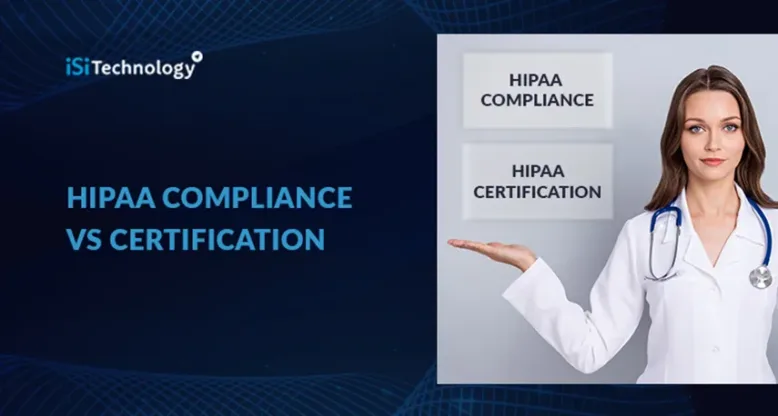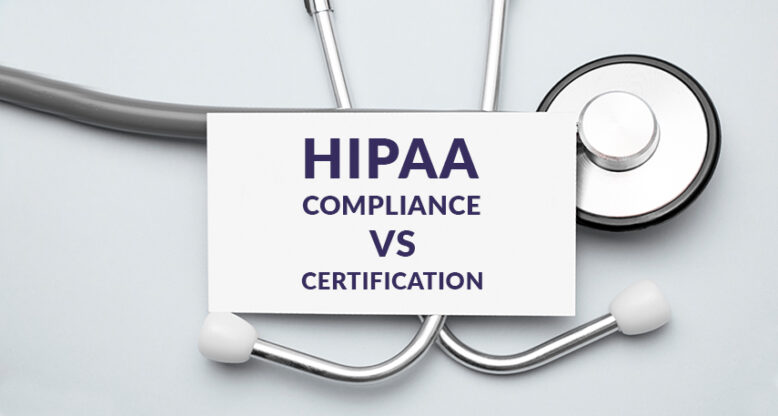HIPAA Compliance vs Certification

The U.S. healthcare industry is highly regulated and requires all organizations and service providers to stay compliant and certified by HIPAA. As a healthcare service provider, such as a hospital, nursing home, or NEMT service provider, it is mandatory for you to ensure that you have the right healthtech HIPAA-compliant software.
HIPAA compliance and certification are two of the most important terms in the healthcare sector. However, both serve different purposes. Therefore, if you are thinking of developing medical software for your healthcare business, this post will help you understand how HIPAA compliance differs from certification and how to achieve a status of a HIPAA-compliant organization.
HIPAA Compliance
HIPAA compliance is the federal government’s attempt to establish rules for healthcare services and insurance companies. This act states the guidelines on how service providers can manage clients’ information and ensure its security.
While the guidelines may vary in scope of application from one organization to another, some are generally mandatory across the board. This involves establishing and planning processes and upgrading healthcare solutions for data protection.
The good news is that organizations do not need to pass an exam to be compliant. However, HIPAA may request audits regularly to make sure that adequate data and information security protocols are in place. There are fines and penalties for non-compliance.
Compliance is an ongoing process. Therefore, your organization must establish, manage and maintain its standards and stay updated about the recent changes to the requirements. You are covered as long as you adhere to HIPAA compliance in medical software development.
HIPAA Certification

Being HIPAA certified is an entirely different domain. This certification indicates that your organization has successfully completed the educational courses necessary for HIPAA compliance. You can complete one or multiple courses internally or seek assistance from a third-party HIPAA compliance expert.
Achieving a certification equips you with academic resources to make smarter HIPAA-compliant decisions when protecting patient information. You can even find customized courses suitable for your healthcare tech needs.
Remember that HIPAA certification does not make you HIPAA compliant automatically. You will have to work towards achieving HIPAA compliance by establishing the standards in processes such as medical software development.
So, if you have completed a HIPAA certification course, your organization is still under obligation to fulfill all HIPAA guidelines to stay compliant with PHI and ePHI security protocols. According to the security protocols, every healthcare organization must develop, deploy, and manage all physical and healthtech processes to protect sensitive information.
Types of HIPAA Certification
If you are a healthcare service provider wondering what options you have for HIPAA certification, here is a list that will help you start.
CHP
CHP is an acronym for Certified HIPAA Professional. This certification course teaches about the basics and application of HIPAA. You can offer this course to your employees as training to make them better at the job in the industry.
Cybersecurity Awareness
This program can teach you about cybersecurity that is applicable to all industries, including healthcare. The institutes teach this course in HIPAA compliance and other generic cybersecurity awareness courses.
CHA
CHA is an acronym for Certified HIPAA Administrator, and it is suitable if you oversee healthcare service delivery. This is a good option to make your employees learn more about HIPAA standards and regulations.
CHSS
If your employees already have a CHP or CHA certification but wish to achieve a higher one, CHSS or Certified HIPAA Security Specialist is the next step. You can offer value to your employees by enhancing their skills through this certification course.
You can even enroll your employees in a data privacy compliance course. The course teaches your employees to learn about the importance of protecting patients’ sensitive information. Furthermore, it also educates you about the benefits of compliance and the consequences of non-compliance.
HIPAA Compliance vs Certification

Here are the most significant differences between being a HIPAA-compliant and HIPAA certified healthcare organization.
Legal Recognition
Compliance with HIPAA’s standards holds a legal status that is mandatory for all healthcare services operating in the U.S. If you fail to comply, you will have to face fines, penalties, or both.
Mandatory or Optional
While HIPAA compliance is mandatory for all service providers operating in the healthcare sector, certification is an optional process. You can still be compliant without achieving any certification. However, certification can provide the necessary education to help achieve your compliance status faster.
Process
HIPAA certification is a one-time process, whereas compliance requires you to revisit your strategies and procedures at regular intervals. This ensures that you are compliant with the latest trends and pre-requisite to uphold your status.
You take a HIPAA course once, learn the necessary skills, and apply them in your daily practice. However, the standards continue to evolve and upgrade, so you have to keep your ear to the ground for new developments in the industry.
Furthermore, you have to obtain certification via a course offered by a third-party while compliance is an internal affair. Both are great options to promote your services as HIPAA certified or compliant accordingly. Doing so will help assure your business partners, patients, and contractor that your business takes information protection seriously.
Conclusion
Healthcare trends show that technology becomes a crucial part of all major processes. If you are a healthcare service provider looking for a HIPAA-compliant medical software development company, ISI Technology is your go-to solution provider. Speak to us today!

One thought on “HIPAA Compliance vs Certification”
This is an excellent blog about HIPAA compliance and certification. You have clearly stated that HIPAA compliance is an attempt by the federal government to create guidelines for healthcare providers and insurance companies. This statute establishes criteria for service providers to follow in order to handle and secure their clients’ information. Being HIPAA certified is a completely separate realm. This accreditation confirms that your company has successfully completed the HIPAA-required educational courses.